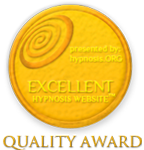
by Dr. Bryan Knight
The short answer is yes. The longer answer follows.
Bulimia (usually defined as binge eating followed with laxatives, vomiting, diuretics or compulsive exercise to purge the body) is a life-threatening malaise.
There are several theories about why people become trapped in this cycle of self-abuse. These fall into three main categories:
- Social
- Family
- Individual
Each, of course, is intimately linked with the others. Hypnosis helps on the individual level which in turn can influence the family and the social aspects.
Society
It is not society’s fault that a particular person is bulimic. However, society certainly reinforces their dilemmas. How does it do this?
Through its emphasis on food — and thinness. Ever watch television and not see a commercial for food? Read a magazine and not see an advertisement for food?
Yet the cover most likely features a very thin woman. And on television you’ll see skinny models and infomercials for weight loss.
So society says thin is good — yet promotes junk food. On top of this, we receive the message that some foods are “bad” and others are “good.”
Similarly, drinking alcohol is adult, drinking alcohol is dangerous.
These contradictions lay a foundation of inner conflict. Especially for emotionally-vulnerable adolescents.
If you eat “bad” foods, you feel guilty. If you force yourself to refrain, you feel deprived. No wonder some people turn to stuffing themselves, and then vomit the guilt.
It often seems that society is telling us we can’t be thin enough. Not surprising then, if you try to be as thin as possible as as to gain validation from outside.
Or, if overweight, feel unaccepted, and unacceptable.
All of society’s contradictions are further underlined in the school system. We teach children (especially girls) to be compliant, rather than independent. We do not teach children to question, to think critically. We teach them to conform — and to regurgitate!
Family
A lot of people with eating disorders come from families which have difficulty to express emotions. It may be that the parents bury their own conflicts, or it may be that their religious or cultural beliefs preclude speaking openly about emotion.
Whatever the reason for the restriction of open expression, the result is often that the children absorb the family’s silent pain. And one way in which a child deals with this unexpressed pain is to punish herself through the misuse of food.
Abuse — emotional, physical, psychological or sexual — within the family can also be a cause for an eating disorder later in life. The child, now grown up, continues to perpetuate abuse only now in the form of harming herself physically, psychologically and emotionally, through binging and purging.
In both lack of expressed emotion and overt abuse, the child’s body expresses the family’s dynamics.
Individual
Bulimia may begin as a person’s reaction to the fear and sense of loss of control when a mood disorder such as depression occurs. When this is the case, treatment of the biologically caused mood disorder is essential — another reason to involve a physician.
More often, bulimia is an ineffective way a person responds to the social and family cues described above. Or to other events.
Anything that causes severe emotional pain may lead to a person using bulimia in a frantic attempt to regain a sense of control. There may be a single originating trauma such as an abortion, divorce, rape, death of a friend. Or the psychological or emotional pain may have come from a series of traumas. Or even from an intolerable, ongoing experience such as a dispiriting marriage, or having grown up in an alcoholic family.
Some individuals become bulimic because, after years of being givers, they tire of always pleasing others but don’t know how to deal with their frustration and resentment.
Yet another possible cause of bulimia can be that your feelings were not validated. That is, when you felt angry, for example, you were told it that it was wrong to feel that way, or that you were selfish, or even that you didn’t really feel angry.
The resulting confusion (because of course, you did feel angry) would likely result in you turning the anger and frustration inward.
Since you had been taught not to express your emotions through words, or to trust your own feelings, one way to deal with the resulting sense of badness or craziness would be to overeat — and then to purge the guilt and shame.
Most bulimics think in “either-or” terms. This leaves no room for the acceptance of mixed emotions. For example, most people have mixed feelings towards their parents. But a bulimic would likely condemn herself for even a fleeting thought of disloyalty or anger toward a parent. Either you love, or you hate. Either you are good, or you are bad. Either you are thin, or you are fat. Either you eat well, or you eat badly.
Such thinking prevents a person from self-understanding and self-acceptance. It goes along with the uncritical absorption of television commercials and magazine ads. It keeps the bulimic’s self-esteem at a low level.
Symptoms
In a futile attempt to soothe herself, the bulimic falls into a see-saw ritual as she tries to regulate the opposing tensions of emptiness and guilt.
Shame increases as the physiological effects of either overeating or malnutrition take effect.
The ritual of binge/purge can also be seen as a sad attempt to exercise control in what may be the only available arena in the bulimic’s life: her body.
Often, though, the body image is distorted. Where others see emaciation, she may see obesity. Desperately, the bulimic comes to define herself through this preoccupation with food and size. Self-esteem is consequently very low because the bulimic can never be thin enough in her own eyes, nor good enough in her own estimation.
There is, of course, a constant preoccupation with food and weight. This focus serves to protect the bulimic from facing the buried unacceptable, or terrifying, emotional conflicts within her or within the family.
Prescribed, or illegal, drugs to lose weight may exacerbate the physical damage and the shame.
These symptoms are not the problem. They are just that, symptoms. Hypnosis can be used to deal not only with these symptoms, but with the underlying problems which give rise to the symptoms.
Hypnosis to get to the Cause
Hypnosis provides a quick route to the cause of an individual’s bulimia. This is because hypnosis allows direct communication with the sufferer’s subconscious. And the subsconscious knows what is at the root of the problem.
Sometimes this is a single event (terrifying sexual abuse, for example); more often there is a series of traumas or conflicts. Each such event builds on the previous ones until the psychological torment becomes intolerable.
Bulimia can then been seen as both a way to exercise control over out-of-control feelings, and as a scream for help.
There are several techniques that a competent hypnotist is trained to use to help bulimics tackle the causes of their suffering. None involve gadgets or touching the client. They may include relaxing music but they are basically verbal. They concentrate on encouraging the bulimic to use her imagination in a creative manner.
To the subconscious, all events, imagined or actually experienced, are “real.” This is a wonderful attribute of the mind.
It means that the bulimic can take some traumatic event that has deeply upset her and, in her imagination, re-write that event so the movie in her mind turns out the way she would prefer.
This results in her subconscious holding the two versions of “reality”. The second gives relief to what has become popularly known as the “inner child.”
It is not that the traumatic event is wiped out. The conscious mind still knows what happened. But the negative emotional impact is diminished. The person no longer needs to purge.
She is freed from the self-punishment.
Hypnosis to Deal with Symptoms
Symptoms, apart from the major one of purging, vary from one person to another.
Hypnosis enables the bulimic to imagine herself behaving differently. Thus, the people-pleasing bulimic mentioned above, who is tired of always being a giver, could use hypnosis to imagine herself instead dealing with her rage and resentment in constructive ways.
Freedom from the need to purge can be encouraged with post-hypnotic suggestions. That is, suggestions given while you are in hypnosis but which take effect after the session.
Usually more than a post-hypnotic suggestion would be necessary to eliminate bulimia. Even the most powerful post-hypnotic suggestions fade over time unless there is reinforcement (by yourself or with the hypnotist) or a profound change in lifestyle.
A main factor in the healing of a bulimic is the attention and validation offered by the hypnotist to the person seeking help. So, even without hypnosis, simply enjoying the experience of the professional encouraging and endorsing your feelings, is hypnotic.
What hypnosis offers you is a method to continue the healing by yourself.
Psychotherapy while you are in Hypnosis
“Either-or” thinking — characteristic of bulimics — permits no room for the imperfections we all possess. Limited thinking prevents a person from self-understanding and self-acceptance. It’s a mind trap with only two gates. It ignores the reality that we can choose to add as many gates as we wish.
“Either-or” thinking is the delight of the sponsors of televison commercials and magazine ads. They can more easily persuade a limited-thinking viewer that such-and-such a food is “good.”
Or, conversely, that you should feel guilty about eating this other product because it brings pleasure to your palate, and fat to your face. Thus is the uncritical-thinking bulimic’s self-esteem kept at a low level.
The “either-or” thinking pattern of most bulimics can be transformed by using cognitive therapy while you are in hypnosis. This simply means the hypnotist helps you to think more clearly, with a wider variety of options than you have been used to. Also to question, to be skeptical.
This happens more quickly when you are relaxed in hypnosis than it would during ordinary psychotherapy.
Such a change in patterns of thinking allows for the acceptance of mixed emotions. And for the evaluation of what others tell you. Ultimately, critical thinking makes freedom from bulimia possible.
Hypnosis can increase your self-control, your self-liking, your self-esteem and therefore, your self-protection.
Hypnosis provides a safe, healthy way to soothe yourself.
Distorted body image is characteristic of the bulimic, who often feels she cannot be thin enough. Hypnotic techniques can gradually help her adjust her perceptions to reality.
Similarly with unexpressed emotion. With hypnosis, you can unlearn messages the family may have implanted about keeping feelings in. You can learn how to safely express emotion, instead of stuffing it down and purging it out.
In the hypnotist’s office, relaxed in hypnosis, you use your mind to allow yourself to feel, and to imaginatively rehearse the safe expression of emotion. This purging of emotion in a safe environment can translate into your not needing to purge food. You have undercut the need for the metaphor (food-purging) by experiencing the reality (emotion-purging).
You can also use hypnosis to give yourself post-hypnotic suggestions about eating normally, being free from the urge to purge food, being in control in healthy ways, etc.
In addition, you could use hypnosis to provide yourself with a “trigger” — a word, a gesture, or an image — which automatically stops you from harming yourself.
Hypnosis can help you use your inner strengths to stop your body being the vehicle which expresses your family’s disturbed dynamics.
Hypnosis can also strengthen your resolve to be your own person — to resist the impact of the diabolical and paradoxical TV and magazine advertising which advocates both food and thinness.
Ultimately, hypnosis helps you achieve what all psychotherapy seeks: that you attain enough independence to trust your own judgement, and retain enough interdependence that you contribute the most to society that your unique personality can offer.
Hypnosis does this by enabling you to tap into your subconscious resources, and thus to strengthen your self-control.






